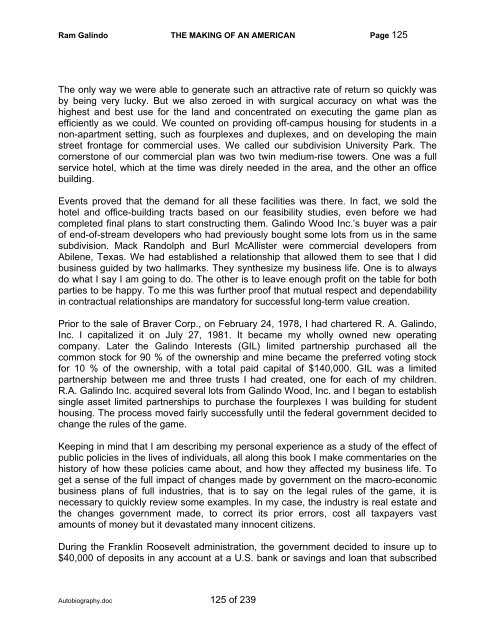Autobiography - The Galindo Group
Autobiography - The Galindo Group
Autobiography - The Galindo Group
You also want an ePaper? Increase the reach of your titles
YUMPU automatically turns print PDFs into web optimized ePapers that Google loves.
Ram <strong>Galindo</strong> THE MAKING OF AN AMERICAN Page 125<br />
<strong>The</strong> only way we were able to generate such an attractive rate of return so quickly was<br />
by being very lucky. But we also zeroed in with surgical accuracy on what was the<br />
highest and best use for the land and concentrated on executing the game plan as<br />
efficiently as we could. We counted on providing off-campus housing for students in a<br />
non-apartment setting, such as fourplexes and duplexes, and on developing the main<br />
street frontage for commercial uses. We called our subdivision University Park. <strong>The</strong><br />
cornerstone of our commercial plan was two twin medium-rise towers. One was a full<br />
service hotel, which at the time was direly needed in the area, and the other an office<br />
building.<br />
Events proved that the demand for all these facilities was there. In fact, we sold the<br />
hotel and office-building tracts based on our feasibility studies, even before we had<br />
completed final plans to start constructing them. <strong>Galindo</strong> Wood Inc.’s buyer was a pair<br />
of end-of-stream developers who had previously bought some lots from us in the same<br />
subdivision. Mack Randolph and Burl McAllister were commercial developers from<br />
Abilene, Texas. We had established a relationship that allowed them to see that I did<br />
business guided by two hallmarks. <strong>The</strong>y synthesize my business life. One is to always<br />
do what I say I am going to do. <strong>The</strong> other is to leave enough profit on the table for both<br />
parties to be happy. To me this was further proof that mutual respect and dependability<br />
in contractual relationships are mandatory for successful long-term value creation.<br />
Prior to the sale of Braver Corp., on February 24, 1978, I had chartered R. A. <strong>Galindo</strong>,<br />
Inc. I capitalized it on July 27, 1981. It became my wholly owned new operating<br />
company. Later the <strong>Galindo</strong> Interests (GIL) limited partnership purchased all the<br />
common stock for 90 % of the ownership and mine became the preferred voting stock<br />
for 10 % of the ownership, with a total paid capital of $140,000. GIL was a limited<br />
partnership between me and three trusts I had created, one for each of my children.<br />
R.A. <strong>Galindo</strong> Inc. acquired several lots from <strong>Galindo</strong> Wood, Inc. and I began to establish<br />
single asset limited partnerships to purchase the fourplexes I was building for student<br />
housing. <strong>The</strong> process moved fairly successfully until the federal government decided to<br />
change the rules of the game.<br />
Keeping in mind that I am describing my personal experience as a study of the effect of<br />
public policies in the lives of individuals, all along this book I make commentaries on the<br />
history of how these policies came about, and how they affected my business life. To<br />
get a sense of the full impact of changes made by government on the macro-economic<br />
business plans of full industries, that is to say on the legal rules of the game, it is<br />
necessary to quickly review some examples. In my case, the industry is real estate and<br />
the changes government made, to correct its prior errors, cost all taxpayers vast<br />
amounts of money but it devastated many innocent citizens.<br />
During the Franklin Roosevelt administration, the government decided to insure up to<br />
$40,000 of deposits in any account at a U.S. bank or savings and loan that subscribed<br />
<strong>Autobiography</strong>.doc 125 of 239


